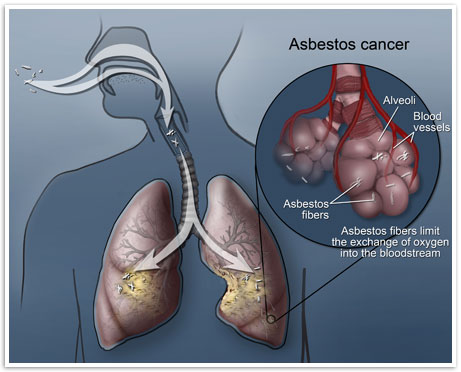Since 2000, asbestos materials are banned in the UK because they contain fibres that cause serious health problems and even fatality when breathed in.
In addition to the condition called asbestosis, inflammation and scarring of the lungs, a type of cancer known as mesothelioma is the by-product of asbestos exposure. Predominantly affecting the lining of the lungs and lower digestive tract, mesothelioma affects the membrane lining that covers most of the body's organs. Since symptoms only make themselves known around 40 to 60 years after exposure, mesothelioma will tend to have advanced to a serious stage. Although there is currently no cure, the medical profession has developed a number of treatments to stop the growth of tumours, reduce their size or at least ease the associated symptoms.

This guide describes the treatments available for the most common type of asbestos related cancer - pleural mesothelioma which affects the lungs. The treatments a patient will be prescribed will depend on how far the cancer has progressed (there are a number of stages) and their general state of health.
Surgery
Patients suffering from early stage mesothelioma often have surgery to remove as much tumour as possible to give complimentary treatments a better chance at fighting the cancer. If the mesothelioma is more advanced, surgery aims to slow the growth of tumours. Whether diagnosed with early or late stage mesothelioma, surgery is also used as a palliative treatment (also called debulking) to ease symptoms such as difficulty breathing.

The type of surgery most commonly performed for pleural mesothelioma is called a pleurectomy or decortication. The membrane (pleura) covering the lung is removed and the pleural space surrounding the lung is treated to prevent fluid collection which hampers breathing.
Chemotherapy
If your mesothelioma is in the early stage, chemotherapy (injecting cancer fighting drugs into the vein) is often prescribed before surgery to shrink the tumour with the aim of easier removal during surgery. On the other hand, chemotherapy may be prescribed after an operation in the attempt to delay regrowth of the cancer. A course of chemotherapy could be needed weekly or every 2 to 3 weeks, depending on the type of drug concoction used.
For patients with advanced mesothelioma, chemotherapy is proven to be helpful in shrinking tumours or slowing their growth to prolong life expectancy.
Radiotherapy
The use of high-energy rays, otherwise known as radiotherapy, is also a common treatment for cancer. It offers similar benefits to chemotherapy.

Palliative Care
Patients with advanced mesothelioma may be too ill for their body to withstand the more aggressive treatments described above. In this case, or as a compliment to the above treatments, the medical profession have a range of palliative treatments to improve quality of life and tackle common related problems such as pain, breathing difficulties and weight loss.
Palliative care includes the following treatments:
- Diet management;
- Physiotherapy;
- Pleural tap - a procedure to drain excess fluid collecting around the lungs.
- Pleurodesis - a procedure to seal the pleural space and prevent fluid from collecting using sterile talc. This does not involve major surgery.
- Indwelling catheter - if a patient is still not able to breathe properly after draining the fluid collecting around, a tube is inserted for a few weeks to continuously drain fluid. Patients can remain at home during this process.
Conclusion
The gravity of pleural mesothelioma and its treatments demonstrate clearly why asbestos materials are banned. It is encouraging to know however that the medical profession continues to work on the advancement of treatments for mesothelioma, so there is hope for the future. Additionally, as with any type of cancer, the earlier this condition is diagnosed, the more chance there is of managing it, so anyone who has been exposed to asbestos (no matter how long ago) should visit their GP regularly for examination.







